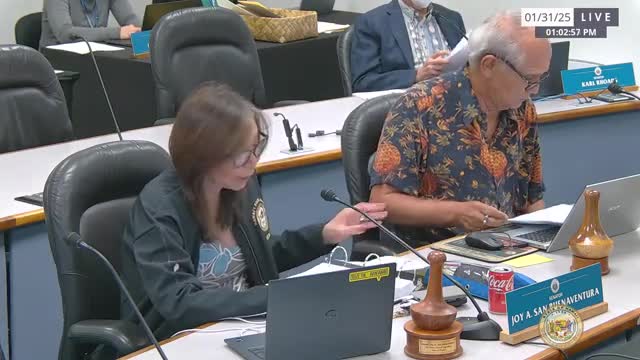Senate committees advance multiple environment and water bills, including accelerated cesspool conversion and Red Hill cleanup standards
Get AI-powered insights, summaries, and transcripts
Subscribe
Summary
At a joint hearing on the 1 p.m. agenda, senators advanced several environment- and water-related measures, moving bills on cesspool conversion, underground storage-tank remediation at Red Hill, producer-responsibility planning and recycling, while deferring others for more study or funding clarifications.
At a joint 1 p.m. hearing of the Senate Committee on Agriculture and Environment and the Senate Committee on Health and Human Services, senators advanced a package of environment and water bills and took action on multiple measures addressing cesspools, the Red Hill fuel facility, water testing, extended producer responsibility and recycling programs.
The most debated topic was legislation on cesspool conversion. Supporters, including Ted Bohlen of the Hawaii Reef and Ocean Coalition, told the committee the bills target the state’s largest source of water pollution. “This is a big bill with a big purpose,” Bohlen said during testimony, adding concern that conversions so far amount to only “a couple hundred a year” while the state needs thousands annually. The committee accepted amendments on several cesspool bills that move up conversion deadlines or add implementation language and requested Department of Health (DOH) staffing and appropriation details be recorded in the committee reports.
DOH and other agency witnesses repeatedly urged the committee to specify funding and staffing details. Department of Health staff identified positions they say are needed for grants review and program implementation; committee members noted the bills will include requests for permanent engineering positions and accounting support. As the DOH witness put it during questioning on remediation and compliance language, laboratory reporting limits “are not 0,” and adequate sampling and scientific methods must be written into any statutory cleanup standards.
The committee also considered SB 639, which addresses remediation of jet fuel contamination from underground storage tanks and specifically references the Red Hill facility. Environmental witnesses urged a binding legal remediation standard. Board of Water Supply representative Ernie Lau urged the committee to retain broad cleanup goals while recognizing sampling limits and missing historical fuel inventories; Lau said the difficulty is defining “all” contaminants and recommended keeping the statutory goal of complete removal while allowing implementers to target additional constituents if the Navy or other parties disclose them.
On broader waste policy, the committee heard testimony on an extended producer responsibility (EPR) needs assessment and advisory structure (SB 674). Industry groups suggested membership changes to the advisory body (for example, adding both food-industry and durable-goods representatives) while composting advocates asked that compostable products be explicitly considered alongside recycling and reuse. The committee voted to pass SB 674 with amendments that add a food-industry seat to the council and include other technical changes.
Lawmakers also discussed deposit-beverage and recycling proposals. Witnesses for SB 1067 urged statutory amendments and the attorney general flagged potential constitutional issues tied to a grant without standards; the committee moved forward with the attorney general’s and DOH technical suggestions.
Several items were deferred for further work. The committee deferred SB 664, which would expand DOH water testing authorities for private premises, citing concerns about duplication with county and federal responsibilities and outstanding cost estimates. Committee members asked DOH and county water utilities to coordinate before the bill proceeds.
Votes at a glance - SB 472 (cesspools): Deferred indefinitely (chair stated inability to move the deadline onto lower‑income households without conversion funding). - SB 501 (cesspools): Passed with amendments; committee will add defective date and record DOH requested positions in committee report. - SB 675 (cesspools/grant funding): Passed with amendments; committee asked DOH to provide dollar amounts for positions to include in the committee report. - SB 958 (cesspools/compliance program): Passed with amendments; committee added defective date and recorded DOH request for engineering and accounting positions. - SB 639 (underground storage tanks/Red Hill): Passed with amendments; the committee replaced a statutory “removal of all” standard with language requiring cleanup “as soon as practicable” while stating the goal of complete removal of jet fuel and additives. - SB 664 (water quality testing/DOH authority): Deferred indefinitely for further coordination with counties and EPA. - SB 674 (extended producer responsibility/needs assessment): Passed with amendments (added food industry representation; committee note re: possible $1,000,000 contract request). - SB 1067 (deposit beverage container program): Passed with attorney general and DOH suggested amendments; committee added a defective date. - SB 946 (wastewater management): Passed with DOH technical amendment (replace “and” with “or” in specified language) and a defective date.
Why it matters: The committee’s actions accelerate statutory timetables on several pollution-control efforts and direct DOH to expand staffing and administrative capacity. Those decisions will affect implementation timelines, appropriation requests and the distribution of state grant funds used to help households and local governments convert cesspools and remediate contaminated sites.
What comes next: A number of bills passed with amendments and will be moved forward in the Legislature. Several measures were deferred so DOH and county agencies can provide more precise cost, staffing and program coordination information for the committee reports.
